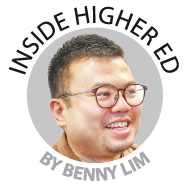UNDER normal circumstances, students defer their enrolment or studies for a few common reasons. Some are keen to take time off to travel and reflect on their plans before they embark on their higher education.
Existing students in institutions of higher learning (IHLs) might see the gap year/semester as an opportunity to take on self-initiated internships.
Financial difficulty is also a trigger that leads students to defer their studies. Students sought shorter-term employment during the gap year or semester to save up their college fees.
In just two short months, the Covid-19 pandemic has brought about an economic downturn, coupled with a surge in unemployment rates in Malaysia. Among those who lost their jobs or had their salaries cut include parents of students pursuing higher education.
Some local students take on part-time jobs to support their education. Many of them are also likely to have lost some, if not all, their sources of income since the implementation of the movement control order (MCO).
With the ongoing economic conditions, it comes as no surprise that some tertiary students are considering or have decided to defer their enrolment or studies to later semesters due to financial challenges, with a number of them only planning to return to school next year.
Yet, the unfavourable economic situation poses a challenge for these students to secure employment, especially when they have yet to complete their studies and obtain any formal qualifications.
For many private IHLs, or IPTS, April and May are peak months for enrolment. With lower than expected new enrolment and the absence of a stimulus package for the higher education sector, many IPTS are facing severe financial devastation.
Despite their own financial burdens, a number of IPTS are rolling out flexible instalment and payment schemes so that students facing problems can continue their studies. Students should follow up with their college or university on the available initiatives before arriving at a decision to defer their studies.
Apart from financial reasons, some students are deferring their enrolment or studies due to the uncertainties, especially when IHLs have yet to be given the green light to recommence face-to-face teaching during the conditional MCO.
To a certain extent, these deferments also imply students’ scepticism towards the shift to online learning.
In his Teachers’ Day speech, Prime Minister Tan Sri Muhyiddin Yassin expressed his appreciation for teachers who employed digital tools for teaching and learning during the MCO.
In the same speech, he reiterated that virtual learning would be the future, and urged teachers to continue enhancing their online teaching capabilities.
His speech appears to echo circulars issued by the Department of Higher Education, reinforcing the idea that online teaching and learning will be the new norm.
One thing is for sure, IHLs and their academic teams are better prepared for online teaching and learning now than the early days of the MCO. Some institutions have arranged additional training for faculty members to equip them with better capabilities in using digital learning tools.
Besides mastering digital tools, Associate Professor Dr Lin Siew Eng, who heads Berjaya University College’s Centre for Teaching and Learning, also stressed on the importance of grasping the philosophy behind online teaching.
In one of her training sessions, Lin reiterated how academics should facilitate online learning in ways where students could become self-directed learners and producers of learning content.
Besides conducting training to academic colleagues, Lin is also organising an online workshop for students, in hope of preparing them to make the best out of their online learning experience.
The shift towards online teaching has also facilitated heightened sharing among academics (within and between IHLs) on effective online teaching methodologies, as well as creative approaches in meeting learning outcomes.
All in all, the migration to remote learning does seem rather positive. Definitely, there are also pressing issues to resolve, such as poor internet accessibility in certain locations.
There is no doubt that the pandemic is going to reshape how society operates in future. In other words, the employment landscape we know of is forever changed. There is no better time to be in an academic environment, where arguments and reflections on post-Covid-19 possibilities and opportunities could be actively debated.
To sum up, a lot has happened over the last two months. New behaviours and habits are expected of both students and faculty members.
Although students are engaged in home-based learning and not physically on campus, many IHLs have, in fact, actively stepped up on their teaching capabilities and pastoral care for students since the MCO.
I urge students who are thinking of deferring their studies to reconsider their decision.
Associate Professor Dr Benny Lim is the Dean of Faculty of Liberal Arts, and the Acting Dean of Faculty of Hospitality and Tourism, Berjaya University College. The views expressed in this article are his own and do not represent the university he is associated with. Comments: letters@thesundaily.com













